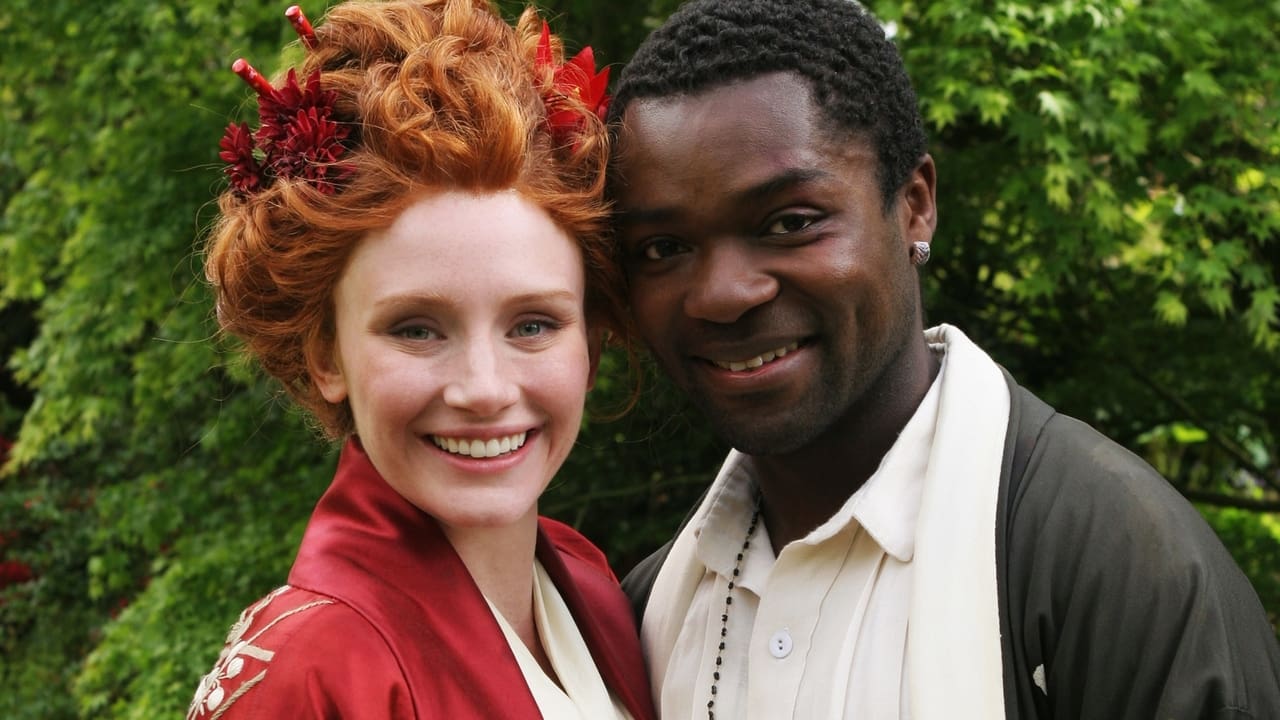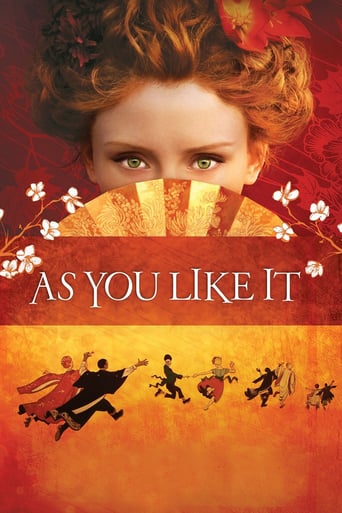

Critics were pretty divided on this, but I thoroughly enjoyed it. Probably my second favorite of Branagh's films (both Shakespeare and not) after "Henry V". It's a sweet and joyful affair, with a load of fun performances, and a re-imagining by Branagh of the story taking place in 1880s Japan (!), which seems an odd idea, but actually ends up working quite well. Bryce Dallas Howard is a terrific Rosalind, perhaps my favorite I've seen. She makes the text completely comprehensible without losing it's poetry. She's funny, sexy and wonderfully lovable. (Why she hasn't become a bigger star I'll never know). David Oyelowo is her match as Orlando, making his love-sick swooning and single-minded romantic obsession tremendously appealing and human – never whiny (a danger in this role), and never losing his considerable charisma and smolder. This is a rare case where on-screen love at first sight is believable, endearing and hot. There are terrific supporting turns from Kevin Kline, Brian Blessed (excellent in a double role), Adrian Lester, Janet McTeer and Alfred Molina (just to name a few). There are places where one can carp: even in a comedy Howard's disguise as a boy would fool no one, and makes a number of moments feel silly (would it have been so hard to at least put all of her wild and distinctive hair under her cap instead of letting much of it come flowing out?). Sometimes Branagh interrupts his excellent, more classic visual style with a slightly wobbly stedicam 360, which call more attention to themselves than they should. And a couple of minor characters feel a less than needed in this cut down version. But those are small complaints. This is Shakespeare that isn't 'good for you', but that is as fun and playful (and occasionally quite tense) as any wonderful romantic comedy. Yes all the poetry and insights into human affairs are there, but they flow naturally, instead of making one feel force fed. I'd imagine this would be a great film for teens studying the play. It makes it immediate and alive, passionate and sexy.
... View MoreI've always loved Shakespeare, ever since reading Twelfth Night 10 years ago in my last year in primary school. And I have great respect for Kenneth Branagh. You can clearly tell by his acting and how he directs Shakespeare that he respects the bard's writing while making it accessible for a wider audience. His casting choices are often spot-on too, yes with the odd questionable choice but never serious enough to bring the film drown too much. All of his Shakespeare film adaptations are well worth watching at least once with his weakest being Love's Labours Lost and my personal favourite being Much Ado About Nothing. As You Like It is not as good as his Much Ado About Nothing, Hamlet and Henry V(I need to check if his 80s Twelfth Night would count, if so that applies too), but definitely superior to Love's Labours Lost. It does have its flaws, the Japanese culture is not all that authentic and Rosalind's disguise is completely unconvincing- nowhere near masculine enough- that it does raise laughs at how Orlando could fail to see through it. However, it does look absolutely beautiful with stunning locations, sumptuous costumes and some of the most beautiful photography in any of Branagh's movies. The music is witty and lively as well as sweet and lilting. The writing is amusing and poetic, in short faithful in spirit to Shakespeare.The story is well-paced and still has that sense of fun, and the idea to have Branagh to only direct rather than do that and cast himself as well was a refreshing one. I personally have no idea with Branagh casting himself in his films actually, criticise him all you want about him being self-indulgent, I think it further reinforces how talented and versatile he is.(Besides he is not the only one to do it, Orson Welles and Laurence Olivier did it too and Alfred Hitchcock appeared in cameos in a lot of his films). The cast are great. Bryce Dallas Howard is beautiful and charming, and Romola Garai is adorable. Jade Jeffries and Janet McTeer are also well cast. David Oyelowo is a dashing Orlando, and doesn't make him too much of a pretty-boy and not much else. Richard Briers as always is a pleasure to watch, while Alfred Molina is delightfully silly and Kevin Kline, while not as well used as he was in 1999's A Midsummer Night's Dream, is also sterling, doing justice to the play's best soliloquies. I do absolutely agree with another reviewer with the lack of any praise for Brian Blessed. He does two roles that are completely different from his personality and anything else he's done, and gives Frederick some arch without ever resorting to camp(he's also quite nuanced in this role) and Duke Snr a surprising amount of poignant subtlety, bringing to life Shakespeare's writing in the way not many people today do in one role. Overall, Branagh has done better but I still think As You Like It was much better than I heard it was, which prior to watching was mostly negativity or indifference. 8/10 Bethany Cox
... View MoreI cannot make up my mind whether the play is bad (it's not Shakespeare's greatest) or the film is bad (it's definitely not Branagh's finest hour). I think it's a bit of both. I went in with high expectations (after Branagh's Henry V, Much Ado About Nothing, and Hamlet), but hated the whole enterprise from start to finish.The music was poor, Rosalind was mis-cast, and the whole Japan setting was a really bad idea that did not work.I hope this was just an aberration on Branagh's part and he can return to form. He is capable of excellent work with Shakespeare's plays, but this is a bad choice of play, badly done.
... View MoreSeeing As You Like It, William Shakespeare's romantic comedy of mistaken identity brought back memories of an amateur production of the Carousel Theater here in Vancouver many years ago in which my son David played a small role. It was a wonderful presentation that thoroughly captured the genius of Shakespeare's delightful imagination. Unfortunately, the new filmed version by Kenneth Branagh with its big budget and professional cast is not in the least bit as convincing or entertaining. It is miscast, over produced, over acted, and simplistic with its multi-layered plot made easier to follow than Sesame Street.Set in Japan in the 19th Century after the country was opened to the West as a trading partner, the royalty of England have been reinvented as wealthy merchants living on the Japanese seacoast. Neither the opulent backgrounds nor the conceit of the script, however, has any impact on either understanding or enjoyment of the play and the setting seems to be simply a marketing decision not an artistic one. The film opens with a kabuki scene at the court of Duke Senior (Brian Blessed). His brother Frederick, also played by Blessed with black hair, interrupts the proceedings to forcibly overthrow his brother's dukedom and the elder Duke is banished to the Arden Forest. Orlando, played by the Nigerian born David Oyelowo, and his brother Oliver (Adrian Lester) then proceed to fight over their position in the court.Oliver, aligned with Frederick, entices his brother to take on a 300-pound sumo wrestler to all but certain doom but, as the script will have it, the underdog prevails in spite of a weight differential of about 150 pounds. In addition to being victorious at sport, he also falls for one of his well-wishers, the attractive Rosalind (Bryce Dallas Howard), daughter of Duke Senior. Fearful of her safety at the court, Rosalind, pretending to be a man and, taking the name of Ganymede from the handsome cup bearer to the Gods in Greek mythology, sneaks out with her cousin Celia (Romola Garai) and the clown Touchstone (Alfred Molina) to seek out her father in the Forest of Arden. Soon they are joined by Orlando who also fears for his life after a fight with his brother Oliver over their inheritance.Before long, a bunch of other personages wander into the film including a melancholy philosopher named Jaques (Kevin Kline) who is described as "an exiled courtier", a young shepherd Silvius (Alex Wyndham) who pursues his reluctant girlfriend Phebe (Jade Jefferies), and others. Curiously, there are two characters named Jaques and two named Oliver, something that most writers would go to any length to avoid. The play is best noted for the cynical soliloquy chronicling the seven ages of man, "All the world's a stage and all the men and women merely players: They have their exits and their entrances, and one man in his time plays many parts", delivered with properly dour expression by Kline.It would not be a Shakespearean comedy without some gender confusion and Rosalind, after noticing Orlando's love poems neatly positioned on trees all over their neck of the woods, knows that Orlando loves her. Approaching Orlando in her boy disguise as Ganymede, Rosalind endeavors to teach him the finer points of courtship if he would just pretend that he is a she. She uses her charm to seduce Orlando, but also is drawn reluctantly into a relationship with the shepherdess Phebe. In Elizabethan conventions, this meant that a boy playing the girl Rosalind would dress as a boy and then be wooed by another boy playing Phebe.Quite naturally, this being a comedy and all, everyone ends up happy, (dramatized in a finale of the utmost silliness by Branagh) except for Jaques who, in character, decides not to return to the court. All the pieces are in place for the film to be successful but there are key elements that work against it. For the play to work at all, Rosalind has to be believable as a young man. If she is not, Orlando looks like a complete fool, and the play is robbed of its intended homoerotic playfulness. In this case, Branagh does not even attempt to have Rosalind look masculine and the scenes with Orlando in which he/she is teaching him how to express his love are unconvincing (unless you read it that Orlando goes along with the ruse and the author is simply making a statement about role playing, the masks people wear (himself?) in life, and the inauthenticity of self).Rosalind is supposed to be pure, innocent, perhaps a little naïve but definitely virtuous. Howard, however, is very un-maiden like in appearance and manner and lacks any noticeable chemistry with her lover. She tries so hard to put the correct inflections in the words that she robs them of whatever poetry they might have had, conveying the impression that she is trying out eagerly for a grammar school play. This is Branagh's fifth attempt to put Shakespeare on film and I'm sure it won't be his last. After achieving considerable artistic but not financial success with the first three, he has opted in this latest film for less of an artistic statement than an overtly commercial approach. Love's Labours Lost was an unmitigated disaster scorched by the critics and shunned by audiences. Unfortunately, As You Like It may follow in its path.
... View More